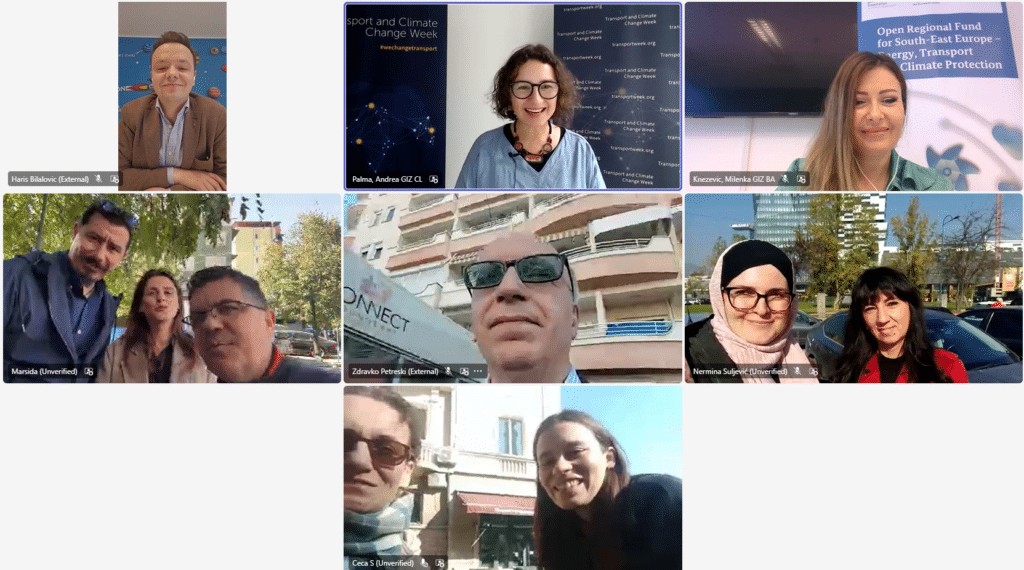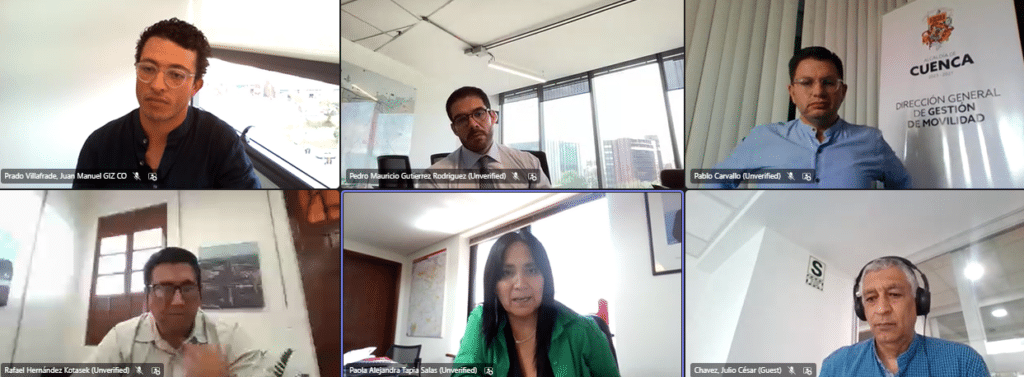
The United Nations estimates that by 2030 more than two thirds of the world’s population (68 %) will live in urban areas. Therefore, urban mobility is increasingly being challenged to adapt and change to meet goals related to the National Determined Contributions (NDCs) and the Paris Climate Agreement. To achieve the Sustainable Development Goals (SDG), opportunities need to be actively crafted to steer the equal and sustainable development of urban mobility.
The second day of the Transport and Climate Change Week 2024 focused on Multisectoral Urban Mobility – by #ConnectingtheDots of solutions worldwide. Political leaders, practitioners and researchers came together to discuss chances of political leadership and international networks and shared integrated transport system solutions and applicable vehicle efficiency regulations. They further highlighted suitable ways of adaptation and the importance of gender considerations for more inclusive and just mobility on a local and global level. The event showcased multiple layers of urban mobility and how partner countries of the Deutsche Gesellschaft für Internationale Zusammenarbeit (GIZ) are shaping the transition.
Action requires political courage, long-term plans, and the capacity to integrate solutions. Strong political leadership is crucial to connect the dots. The ministers from Chile and Colombia shared their experiences and recommendations on how to achieve well-integrated public transport systems. They emphasised that improving the quality of public transport is a key factor to motivate inhabitants to choose collective modes of transport over individual transportation.
International exchanges create a frame for the transition towards more sustainable mobility by building a collective understanding and, thus, helping to standardise outcomes. A strong example of these opportunities shaped through international cooperation is the Hamburg Charter for Inclusive and Just Mobility, which was reported during the conference day. International efforts were also made during the World Urban Forum in Cairo, which took place in parallel to the Transport and Climate Change Week. Both seek to connect urban development, economic growth and employability by addressing the need of equity and accessibility to sustainable mobility.
Providing a live experience of equitable mobility policies in action, city officials shared their way of transformation by answering ‘Who owns the public space?’ on a walk through the Western Balkans. By prioritizing people cities are not only improving conditions for pedestrians and cyclists, but also the quality of life for their inhabitants. The integration of schools and cultural development into mobility infrastructure further strengthens communities.
A particularly remarkable case is the City of Paris where local authorities took the opportunity of hosting the Olympics and Paralympics 2024 to create long term transformation of the public space. By shaping new mobility structures that last, in accordance with the French national policy on public space redistribution, Paris emphasises that urban mobility is to be understood as active and walkable mobility. This was further accentuated during a conference session on bikeable cities, which encouraged practitioners to apply methodologies that steer change with a system vision, placing life in the heart of public space.
Public transportation is at the heart of sustainable urban mobility. By impacting city’s structure, requiring appropriate energy transition strategies as well as political will to negotiate and organise fleet changes and align operators, it has high potential to steer the systemic transformation of mobility. In this regard, speakers from Latin America provided several insights and business models to integrate public transport solutions. Key take away was the importance of understanding the need of each city and not fall in love with one solution that fits for all. Moreover, informal transport is crucial to cover areas of the city where public transport infrastructure has not yet reached. Therefore, the speakers emphasised the importance of planning with operators, who contribute their experiences, while also securing provision and quality of services for users. A suitable way for cities to secure the availability and quality of public transport can be to own the fleets, as in the case of the Metropolitan Directory of Public Transport in Santiago de Chile. The session on standards and innovations for vehicle efficiency gave perspective towards the time it takes to sustain change. Regulations on vehicle’s efficiency require fuelling policies and taxation strategies accompanied by clear communication to users about the long-term benefits of the transition.

With a session on integrating gender balanced employability opportunities, the Transport and Climate Change Week highlighted the importance of gender considerations in the mobility transformation. Successful cases presented include La Rolita in Peru, Women on the Move/ SafetiPin in India, and Women Mobilize Women in Uganda. Their experience shows that to overcome entry barriers and achieve gender balance in the transport sector, a clear, data-based understanding of the problem is necessary to shape tailor-made solutions.
This year, Transport and Climate Change week focused on ‘Connecting the dots’ to foster transport climate action. The many examples of practitioners, policy makers and researchers presented during this conference, showcased how transport systems are changing. By sharing them with a community of ambitious transport and mobility enthusiasts from all around the world, the conference highlighted the opportunities and dependencies that lay in the different problems, places and solutions. Urban mobility is an important subsector that embodies this connectiveness and dependency of dots to steer a systemic change. By connecting the dots, the Transport and Climate Change Week 2024 made the value of peer networks visible and enabled the sharing of experiences and data between different countries and regions. The table is set for relevant conversations aiming to bring transport lovers, experts, decision makers and users together to enable new ideas and innovation while strengthening the global community.
In 2025, ten years after the Paris Agreement was signed, it is ‘Time to be accountable’. Transport and Climate Change Week will host a core network of transport and mobility experts in Berlin to collectively evaluate the state of transformation, make changes visible and understand how action can be accelerated. The aim is to refresh the climate commitment in an inclusive and sustainable way setting the global community up for the next decade.
The Mobilize Net-Zero project team is organising the Transport and Climate Change Week, alternating between a virtual and face-to-face format. The project is implemented by the Deutsche Gesellschaft für Internationale Zusammenarbeit (GIZ) GmbH and is funded through the International Climate Initiative (IKI) of the German Federal Ministry for Economic Affairs and Climate Action (BMWK).
 Greetings from the Western Balkans during the session on Sustainable Urban Mobility Systems Going Net-Zero / © GIZ
Greetings from the Western Balkans during the session on Sustainable Urban Mobility Systems Going Net-Zero / © GIZ

Andrea Palma
andrea.palma@giz.de
Visit profile